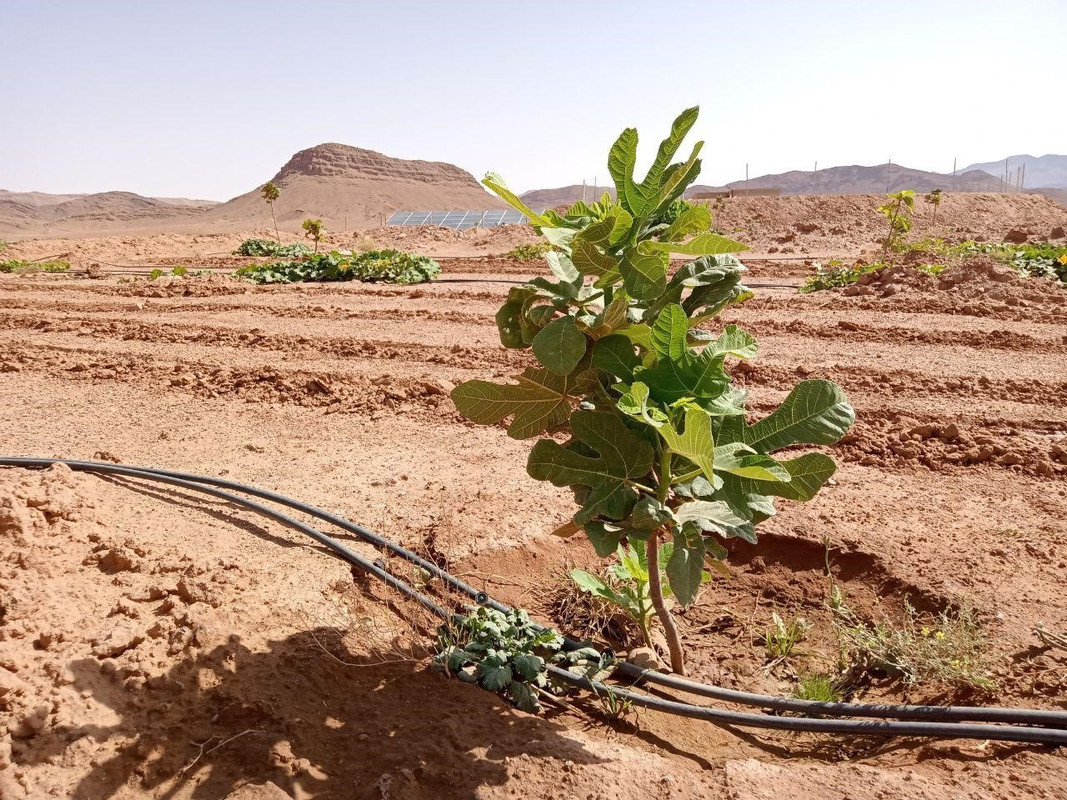Monitoring Trees in El Mengoub Province of Figuig
Monitoring trees with farmers is an essential step in tracking the process of planting trees and their growth in the areas benefiting from the initiative. It opens the way for us to communicate with farmers and assist their agricultural activities with information that helps them acquire steps to take care of the tree. It is also an opportunity to inspect the condition of the trees.
Since the beginning of July in Ain Shair and Matarka, in the Beni Iguil community (Figuig province), which is characterized by a very hot climate around 50 degrees, the High Atlas Foundation (HAF) team monitored a more than 36,000 trees planted at the beginning of February 2022. The team contacted more than 120 farmers, who are changing the usual patterns of subsistence agricultural and livestock activities to focus on planting fruit trees: olive, pomegranates, almonds, figs and more.
The province has also recently witnessed a movement to provide solar energy so that farming families can benefit from drip irrigation systems powered by the heat of the sun. This has prompted many residents to pay attention to agriculture to ensure the future of their families, as well as to preserve the environment and combat the phenomenon of desertification and the crisis of high carbon content in the air.

A model of trees planted in 2021 Ben Iguil province Figuig. Picture by HAF
The El-Mengoub area is considered by the Beni Iguil community as one of the active areas in planting forests, as the El-Mangoub Cooperative seeks in coordination with HAF to make the area a model for environmental and agricultural development. Permanent communication with farmers encourages them to plant trees as the primary solution to the regional crisis of drought and declining rainfall in recent years. This has negatively affected livestock breeding due to the decline in vegetation cover and farmers’ weak purchasing power.
Through the experience of monitoring trees in the region, it has been observed that crises push people to search for alternative solutions and strengthen them to overcome challenges. The environmental crisis, which is represented by dehydration and the decline of vegetation cover, prompted many residents to change their thinking by abandoning livestock breeding and entering the field of agriculture as a means of achieving sustainable development.
The process of monitoring trees has played an important role in developing people’s capabilities and knowledge in the agricultural field and opens the way for communication to help develop their agricultural activities and face challenges. In addition, the residents benefit from the support provided by the Ministry of Agriculture through the preparation of lands with drip irrigation, and a water storage tank that encourages the agricultural field in the region.

Trees planted in 2022. Picture by HAF
In summary, the tree planting team’s efforts to monitor trees in 2021 and 2022 have directly affected this area to become living models of fruit tree agriculture. Tree planting has become the main activity, with a 70 percent success rate.
The farmers in the region have expressed their appreciation for the interest and initiative that HAF is taking. They are ready to continue on this journey, plant more trees, and face the climatic challenges of the region. They look forward to changing the region’s climate and making it a development model for planting trees and raising the country’s economy in the coming years.